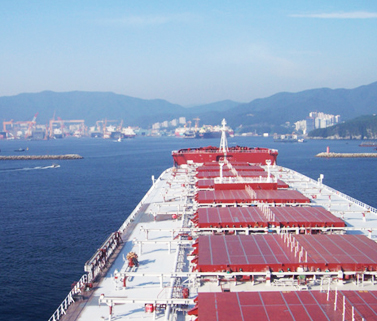ISM Code
Since being designated as International Safety Management System certification body in accordance with the ISM Code by the Ministry of Maritime and Fisheries (MOMAF) on 7 July 1997, KR has been providing ISM audit services on behalf of about 70 national governments, including Panama & Liberia.
Composed of auditors with various seaman experience, the System Certification Center understands the maritime industy and is able to provide audit services meeting the various requirements of our customers.
KR System Certification Center provides ISM education and training and holds a number of seminars regularly to facilitate exchange information with respect to PSC trends, prevention of accidents at sea, system improvement, etc.
- the ultimate goal being the establishment of more efficient safety management system.
KR System Certification Center, through offering simultaneous ISO/ISM certification, endeavors to meet the quality, environment and safety requirements of customer.

Background on the establishment of ISM Code
In the past, for the purpose of ensuring the safety of life, property and the protection of marine environment, International Maritime Organization (IMO) placed its emphasis mostly on the physical aspect of ship such as strengthening of hull structures, equipment, etc. and the improvement of crew's qualifications by adopting international conventions.
Despite IMO's efforts to strengthen various international instruments, the disastrous accidents at sea, for example, a casualty involving "Herald of Free Enterprise", kept occurring.
In analyzing the accidents, IMO became aware that more than 80% of all accidents at sea is due to human error and that measures are needed to prevent such error.
Being mindful of above, IMO decided to formulate and adopt ISM Code (International Safety Management Code) which calls upon shipping companies to establish the safety management system both onshore and onboard for the safety of life, property and protection of marine environment, in addition to calling for the strengthening of physical aspects of ships and improvement of crew's qualifications.
In October of 1993, the IMO Assembly adopted ISM Code as resolution A.741(18) and encouraged Contracting Governments to implement it.
To accelerate the mandatory implementation ISM Code, the IMO, at Diplomatic Conference held in May of 1994, incorporated the Code into International Convention for the Safety of Life at Sea (SOLAS) chapter IX.
The Code has been mandatory for all passenger ships, oil tankers, chemical tankers, gas carriers, bulk carriers, high speed craft of 500 gross tonnage and upwards from 1 July 1998. For all other cargo ships and mobile offshore drilling units of 500 gross tonnage and upwards, the Code became mandatory on1 July 2002.



